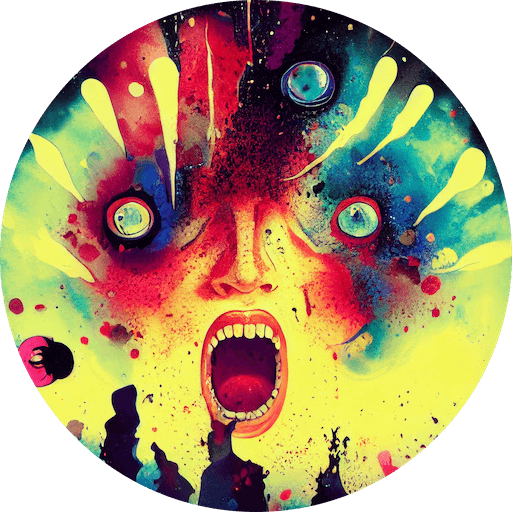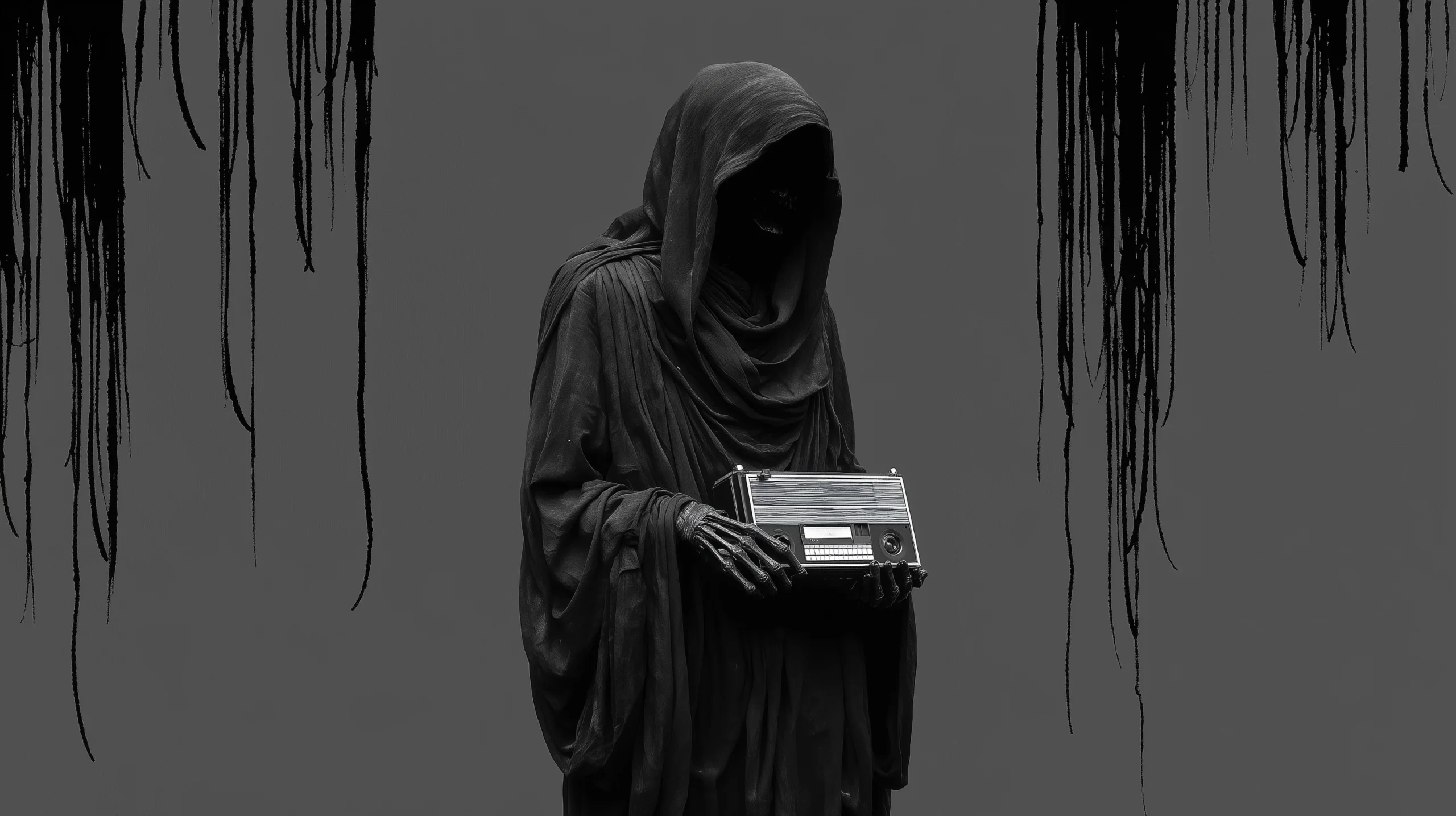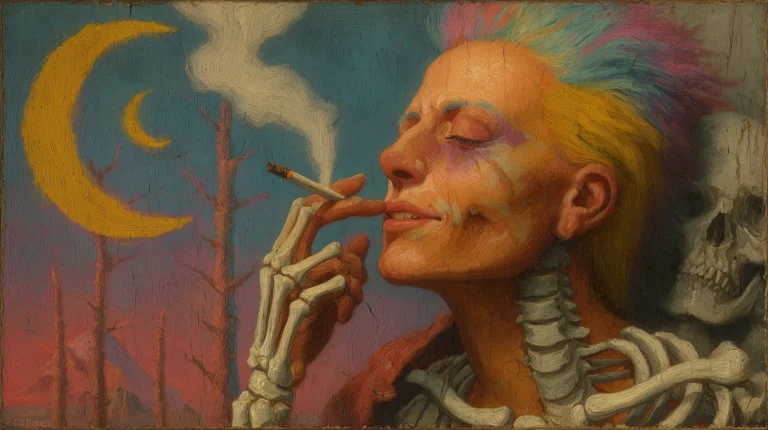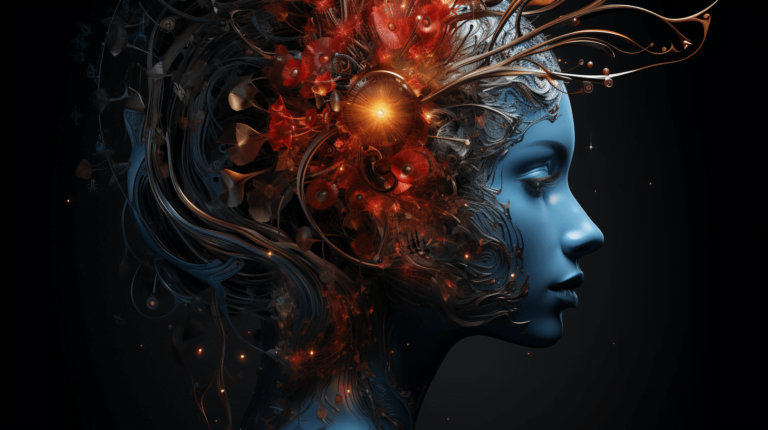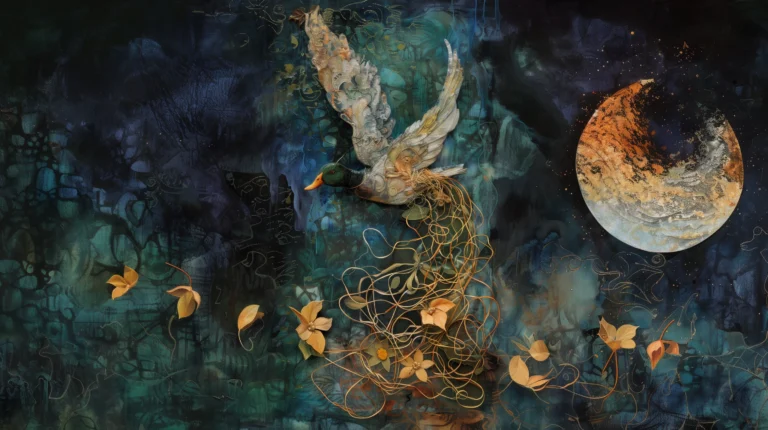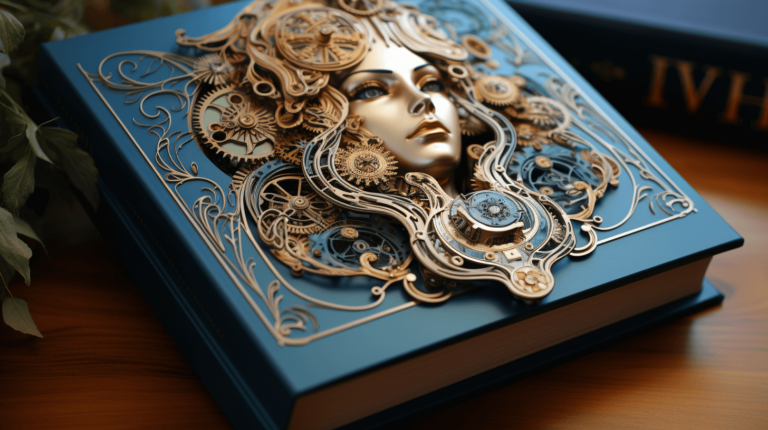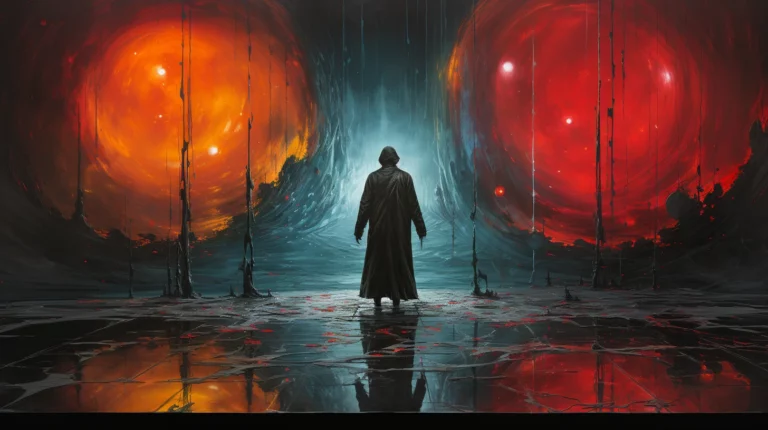The Death of Every Hook: Contradiction Tolerance
…the boy’s mother sick so she died and “came over here to live with me,” said his father. “Now we will live here together,” said Avaiyo’ to his son. That’s the way that boy and his mother went to the spring to live there.
― Joseph Campbell, The Hero with a Thousand Faces
Here we are—right here, right now. Still knowing nothing, diminishing ideas and thoughts. Is there any hook left? Yes: breath. The death of Buddha—Nirvana—means death. Life as we know it now is a combination of bodies, and if one longs for Nirvana, it means going beyond breath, dying to the physical body, dying with the ego, vanishing the name one has been given in the world.
The body is returned to the earth; the psychological process comes to an end. The “I” as I know myself has no continuity—the baggage of thoughts, the knots… Desire is pain, and yet we must fulfill our desires. All desire, you see, brings too much misery; choose one particular desire and pursue that. Follow one desire, achieve it, and don’t get entangled in its loop once it’s fulfilled. Now it’s up to you to play a new game.
Sit still for a moment. Listen to the pulse under your thumb, feel the breath slide in, slide out. You are reading these words inside a moving field of sound, color, memory, and hope. That field is what we call life. It changes before you can name it. “All created things are subject to decay,” the Buddha told his monks. “Work out your salvation with diligence.” In plain speech he was saying, Do not cling. See the river as it is, flowing right through every idea you hold.
Nirvana is your death, and the death of every hook. The non-dual Nirvana is choosing a single itch instead of many—yet even that is still a hook within duality. The common pulse beneath each fragment is the same: life cannot be stopped by thought.
Psychological theories, spiritual systems, even the proud banner of non-dual philosophy must bow before the raw fact of experience, which never stands still. Thought cannot be trusted, for it is bound to the illusory ego—fragile and rigid. This creates a vicious circle: experience chasing itself. Beyond experience, we do not know. That which is beyond knowing remains untouched.
Life is not a thing we possess. It is the unbroken event that includes every object, every feeling, each word on this page. As William James wrote, “The stream of consciousness flows from one moment to another, never twice the same.” Try to hold a droplet from that stream and it is already gone. Hence the Zen warning: the finger that points to the moon is not the moon. Our greatest pain arises when we forget this and mistake the finger for the sky.
A hook is any belief, ritual, or self image that claims permanent truth. “I am my profession.” Hook. “My religion alone saves.” Hook. “Enlightenment means feeling bliss forever.” Hook. Hooks can feel comforting, yet they turn living water into ice. Carl Jung noticed that people often prefer a predictable misery over an uncertain freedom. We grip our hooks because they promise identity. But the price is endless inner friction each time the world refuses to match the script.
Freud, Skinner, CBT, mindfulness therapy, each map reveals useful paths through the forest of the mind. None can replace the forest itself. The Buddha compared doctrines to rafts. If a raft carries you across the river, be grateful, but do not strap it to your back once you reach the other side. Climb the bank, feel the mud between your toes, move on.
Heraclitus said you cannot step into the same river twice. Nagarjuna said there is no river, no step, no steeper. Both teachings shine, yet neither can imprison the flow they name. Joseph Campbell observed that every myth eventually eats its own tail; symbols become literal, power turns into dogma, renewal demands that the form break open again. In the end, every hook must vanish.
Desire is pain, and yet we cannot deny every desire. The itch is the engine of creation, and that itch is you. Without it, no star would flare, no baby would cry for milk, no poem would cross a page. The problem is not desire itself, but addiction to its echo. The Bhagavad Gita puts it neatly: “From attachment springs desire; from desire springs anger when desire is thwarted.” Choose a few itches and pursue them fully, then release them once they have served their turn. This is practical wisdom. It avoids the two extremes of self-denial and self-indulgence.
You cannot hear a symphony by freezing its notes. In the same way, you cannot taste life by standing outside it. Emerson urged, “Always do what you are afraid to do,” which means enter the arena, feel the crush of opposing wills, learn the flavor of sweat. Yet keep one eye on the larger joke: forms rise only to fold back into the nameless sea. This is a great drama, an act of forms, and there is no one to begin the curtains.
When a person nears death, regrets often cluster around untasted possibilities. Lao Tzu warned that unfulfilled desires become ghosts. As death nears, the brain’s terror management system lights up, trying to squeeze more identity from fading time. You can defuse that panic now by testing your itch list. Which games still stir your blood? Which ones can you gladly release?
The clearer your choices, the less the final hour will haunt you with “should have beens.” And if you do not want to play any game, that is your choice too. No one should use your itch to satisfy theirs without true consent. And consent is not just verbal or written, it means creating systems that offer real choice. Not boxing people into an economy where minimum wage makes nine to five seem like consent. That is how two itches end up working to fulfill someone else’s dream of building a rocket. And yes, everyone has the right to chase their own itch, but not at the cost of another’s freedom.
To die before you die is the core of every mystical path. Jesus said, “Whoever loses his life for my sake will find it.” Rumi wrote, “Knock, and He’ll open the door. Vanish, and He’ll make you shine like the sun.” In psychological terms, living death is the moment when a belief structure collapses and the nervous system does not freeze. It watches the collapse and remains open. Instead of reaching for a new hook, it rests in naked immediacy.
Letting go is rarely a single act. It repeats like waves. A relationship ends, grief passes, and suddenly you notice the cling again in some memory. The Buddha suggested a training of gradual release: morality, concentration, insight. Each level loosens another knot.
Viktor Frankl, who survived Auschwitz, discovered something similar. “Between stimulus and response there is a space,” he wrote, “and in that space lies our freedom and growth.” To expand that space is to practice dying while alive.
And let me clarify what Buddha means. Buddha means you, the unique you. Not special, but unique. Everyone is Buddha, and Buddha is just a concept. Even that must die. Death to the Buddha hook. We might use him as an example again, but know it is only an example, an archetype. We do not need a thousand pages. A single meme can shape the mind—just as corporations use their memes to shape yours.
So which itches are worth scratching? No authority can decide. You must weigh each pull against the cost in attention and integrity. One simple test is joy. Does the pursuit light your eyes even when it fails? Another is service. Does the game lift other beings or only feed the hungry ghost of self image? The Buddha chose the game of teaching. Socrates chose the game of questioning. You may choose craft, family, science, activism. Play wholeheartedly, then bow out gracefully.
Death is not the enemy. The enemy is the fear that clutches at images and misses the living spark. When every psychological idea and philosophical system has done its job, let it die. Then watch. From the ash rises renewed perception, clear as the first morning.
The phoenix does not boast of immortality. It knows the flame will come again, and it is willing. So ask yourself gently, Am I willing to select a new itch? If yes, step into the dance. If not, you are still in the dance. Either way, the river keeps singing, and the current carries all home. Yes, each and every one—home. No visa, no guru, no teacher, nothing. By default, home. Rich or poor, home.
One life, one chance, as the saying goes. The stage holds many games: scaling a company, raising a family, composing a song, reclaiming health. Each game offers lessons that disappear when grasped as trophies. The inner spring alone travels intact from scene to scene. Trust in that spring, cultivate fair structures, question every borrowed frame, and contradiction will feel like ordinary weather rather than a storm. Rich or poor, famous or unknown, play the chosen game fully, then let the curtain fall without regret.
True and lasting success is rooted in inner resources rather than external trophies. People who recognise that the real source of achievement lies within remain steady even when money, status, or praise fluctuate, while those who believe success comes solely from luck, circumstances, or other people feel anxious and insecure.
These inner resources include a clear awareness of one’s own presence and breath, personal values like honesty and grit, the capacity for creative problem solving, emotional self‑regulation that turns pressure into focus, a guiding sense of purpose, and a felt connection to something larger than the individual—whether that is a spiritual current or collective intelligence. Because such assets travel with us everywhere, they provide a stable foundation, reduce anxiety, strengthen ethical judgement, and make it easier to adapt when outer plans fall apart.
Main punches
- Play your own game. Stop judging life by the rich people’s scoreboard; measure by your own moves and understand that morals change with the weight of your bank account.
- Generational wealth is built on structure and trust. Families that protect assets, educate their children, and reinvest stay rich while flash spenders fade. Feudal families are still wealthy today using the same private schools, elite universities, clubs, restaurants, and political connections to maintain power. That is their game. The only question is, what is yours?
- The gap between CEO and staff pay reveals the true culture of a company. It quietly decides whose time matters more, whose life holds more value. Who gets to decide that one person’s hour is worth 300 times another’s? This isn’t just economics—it looks like the old structure of ancient Egypt, with pharaohs at the top and workers at the bottom. That mindset never died. It just put on a suit.
- Attention is the real battleground. Ads, memes, and Brexit-style narratives twist reality only when you forget to pause and think. They tell you to hate immigrants while nobody questions the billions wasted by the government. Corporate welfare is the real scam—giant companies begging for handouts while pretending to be self-made. And they’re getting it.
- Rich lifestyles are team sports. Behind every luxury is a network—lawyers, therapists, tax experts, even backup lovers. Copying that without the crew is self-destruction. They live that way because they can afford the consequences. You need to be at their stage to play that game.
- No wealth handouts. The rich will not free the money, and the truth is, most of us would do the same if we were in their position. It is genetic, it is fear, it is self-preservation. But once we wake up and understand this is the only life, a game, a drama, an act, we can choose to act, to speak, to build fair pay systems instead of hiding behind fake morals that are just excuses.
- Hold contradictions like a grown-up. You can crave the luxury watch and still practice thrift. Both truths can live in the same mind. The idea of the self-made lone wolf is PR fiction. Every success stands on mentors, luck, and public resources. Audit your beliefs regularly. If a thought limits you, let it go without drama. This is your one life, your one stage. Know where you stand, make your move, and when it’s time, exit.
I chased desire, thought I was wise,
Got lost in memes and spiritual lies.
Tried being breath, tried being sky
Stubbed my toe and still asked why.
Now I sip tea from a chipped old cup,
One life, one itch, no ladder up.
I say “let go,” yet here I sell
Books on freedom (and death as well).
If your soul is rich or wallet so,
Read A Love Affair with the Universe—go.
And if you’re ready to meet the void’s glow,
Dive deep into Journey of Flow.
Facts That Cut Through the Noise
- People who believe their own actions shape life usually feel less anxious and bounce back faster from stress.
- Feeling powerless often leads to higher worry, sadness and fatigue.
- Quiet awareness practices like mindfulness lower anxiety to about the same degree as common anti‑anxiety medicine.
- Living by personal values gives a steady sense of integrity and boosts life satisfaction.
- Very large gaps between what a chief executive earns and what an average worker earns weaken employee trust.
- Workers in firms with huge pay gaps are more likely to feel disengaged and to quit.
- Fairer pay ratios tend to lift morale, improve retention and can even raise product quality.
- Some studies find modest gaps can motivate ambition but ultra‑wide gaps hurt cooperation.
- Roughly seventy percent of wealthy families lose their fortune by the second generation and ninety percent by the third.
- Families that talk openly about money, teach financial skills and plan inheritances keep wealth the longest.
- Higher education is one of the strongest drivers of long‑term wealth building for any family.
- Owning assets like homes, stocks and small businesses multiplies the chance of passing wealth to children.
- Gifts and inheritances explain a large share of adult net worth in most rich countries.
- Constant exposure to luxury lifestyles on social media makes low‑income viewers feel poorer and less satisfied.
- Seeing rich posts online often triggers envy and can push people toward risky spending or debt.
- Cutting back on those feeds or reshaping them can quickly lift mood in people who struggle with comparisons.
- Strong critical thinking skills make it much easier to spot fake news and conspiracy claims.
- Even short lessons on how misinformation works improve one’s ability to detect false stories.
- Higher levels of education reduce the odds of believing misleading political or economic messages.
- People who pause and reflect before sharing headlines are less likely to spread misinformation.
- Mentors matter. About three out of four high achievers credit a mentor for key career breaks.
- Employees with mentors advance faster and stay longer at their jobs than those without mentors.
- Most jobs are found through personal networks rather than direct applications.
- Teams of diverse minds usually solve complex problems better than any single expert.
- Social capital, meaning helpful connections and support, strongly predicts upward mobility.
- The lone‑wolf success story is mostly a myth because nearly all big wins rely on guidance, teams or networks.
- Inner traits like self trust and clear values work best when combined with outer structures like fair pay, good education and supportive networks.
- Strong inner orientation plus balanced external systems together create the highest resilience and fulfillment.
Dig deeper: see the attached PDF for the full research and detailed findings.
Life is not about reaching a finish line; it is about engaging in the game itself. Religion and spirituality often serve the poor as coping tools for daily hardship, while the wealthy treat them as blissful toys, buying gurus and mixing beliefs to suit their taste because they can, and you cannot. But you can too if you trust yourself.
Morals shift with a person’s mental and financial resilience, so stop condemning others for living by a different code. Ignore the endless headlines from profit‑hungry outlets that pick sides only where the money flows. Observe the drama without attachment, see it clearly, and keep playing your own game.
“Know thyself, one organism, one breath, one vast awareness. Who then is watching?”
It’s not the One who is deciding for the many,
It’s the many who are deciding for the One.
Flow of death
“You may rise from the dream, but not from love, for love is eternal, without end.”
Here we are
face to face with the mirror of breath,
taking one step back to meet the silence
that waits behind every clock tick.
Past lingers like dust on a windowsill;
I brush it off, laugh, watch it settle again,
learning at last to call that dance
a kind of peace.
The river of now keeps pushing through me,
yet even rivers curve and rest in pools.
Flow is not a frenzy—it is the pulse
inside a seed that still appears still.
I ask the wind,
Can the earth spin without a pattern?
It hums its answer, round and round,
showing me that form is not a prison
but a rhythm I can lean upon.
Thoughts arrive uninvited,
stray dogs at the open gate.
I do not chase them away;
I sit and let them curl at my feet
until they drift back into night.
Imagine a day when coins mean nothing,
when art and a quiet room cure the same hurt.
I will paint the walls with questions,
teach the lost to sculpt their sorrow,
call it a school, call it a sky,
call it whatever sets one heart free.
Then I will breathe,
rise from the chair,
start the dance again—
each cycle a first beginning,
each breath the only word
worth repeating.
